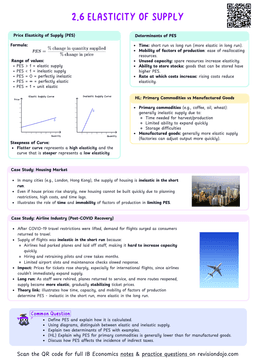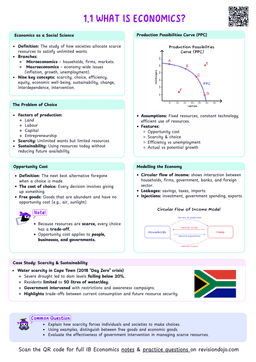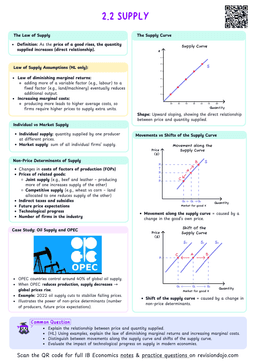While fiscal policy can be a powerful tool for managing the economy, it also faces several constraints that can limit its effectiveness:
- Political Pressure
- Time Lags
- Sustainable Debt
- Crowding Out (HL Only)
Political Pressure
Fiscal policy decisions are often influenced by political considerations, which can lead to suboptimal economic outcomes. For example:
- If a government wants to cut their spending to contract the economy, it may be met with disagreement.
- This is because government spending is usually utilised for the provision of public goods and essential services such as healthcare or education.
- Furthermore, if the government decides to increase taxes, people may protest that decision, hence limiting its effectiveness and possibly leading to loss of support.
Political pressures can lead to short-term decision-making that prioritises political gains over long-term economic stability.
Time Lags
Fiscal policy is subject to delays at various stages, which can reduce its timeliness and effectiveness.
- Recognition Lag: Time taken to identify economic problems.
- Decision-Making Lag: Time required to formulate and approve policies.
- Implementation Lag: Time needed to execute policies and see their effects.
By the time the government comes up with a policy, that policy may not be relevant anymore and a new issue may appear.
NoteTime lags can cause fiscal policies to be implemented too late, potentially worsening economic fluctuations.
Sustainable Debt
- In order to support government spendings, governments sometimes need to borrow money.
- However, they need to be certain that the debt accumulated is sustainable, meaning that they are able to satisfy their due payments.
- If they have debt over a long period of time, it can lead them to default (unable to pay debts back).
High debt levels can lead to higher interest payments, reducing funds available for essential services and investments.
Crowding Out (HL Only)
- When the government implements a expansionary fiscal policy (e.g increase in government spending) without increasing its revenues, the government will need to borrow money to continue to finance its spending.
- This increase in demand for money ($D_{money1} \rightarrow D_{money2}$ by the government causes an increase in the interest rates ($i_1 \rightarrow i_2$), which reduces or "crowd-out" the private investment (I).
- This reduces private investment because private firms will be incentivised to save money because of high returns or borrow less due to high payments for loans.
- Therefore, the increase in government spending (G) and the decrease in investment (I), will limit the expansionary fiscal policy.
Crowding out can offset the positive effects of fiscal policy by reducing private sector activity.
- In the diagram above, we can observe that the initial increase in government spending (G), causes a shift from $AD_1$ to $AD_2$.
- However due to crowding out, the AD decreases from $AD_2$ to $AD_3$.
- This is called "partial crowding out" as the government spending is greater than the fall in investment spending.
- Crowding out can be complete as well, where the decrease in private investment would equal to the increase in government spending.
- In this case, the AD will return to $AD_1$.
Constraints on Fiscal Policy in India
Background:
India, one of the world's fastest-growing economies, relies on fiscal policy, government spending and taxation, to manage economic activity. However, the effectiveness of India's fiscal policy is often constrained by factors such as political pressure, time lags, and the need to maintain sustainable debt levels.
Political Pressure:
In January 2025, despite a noticeable economic slowdown, the Indian government chose to adhere to its previously announced borrowing and spending targets, maintaining a fiscal deficit of 4.5% of GDP. While economists recommended a counter-cyclical fiscal approach, policymakers faced political pressure to avoid increasing government debt beyond projected levels.
Ahead of the 2024 general elections, the government prioritized targeted welfare spending, particularly in rural employment programs, food subsidies, and infrastructure projects. However, this led to concerns about the misallocation of resources, as some of these expenditures were politically motivated rather than economically efficient.
Time Lags:
Fiscal policies in India often suffer from implementation delays due to bureaucratic inefficiencies and lengthy approval processes. Large-scale infrastructure projects, such as highway expansion and urban development, are subject to delays in fund disbursement and land acquisition issues.
For example, the National Infrastructure Pipeline (NIP), a $1.4 trillion initiative announced in 2019, has faced significant execution delays, reducing the immediate impact of fiscal stimulus. By the time funds are allocated and projects are initiated, the macroeconomic conditions may have already changed, diminishing the effectiveness of the policy.
Sustainable Debt:
India's public debt-to-GDP ratio is nearing 80%, significantly higher than the recommended threshold for developing economies. Despite achieving an average GDP growth rate of 6-7%, high fiscal deficits and rising interest payments limit the government's ability to implement expansionary fiscal policies without risking fiscal instability.
The government has attempted to balance debt sustainability by implementing gradual fiscal consolidation, aiming to reduce the fiscal deficit to 4.5% of GDP by 2026. However, with increased global interest rates and mounting external debt obligations, India’s ability to maintain sustainable borrowing levels remains uncertain.
Questions
- Explain how political pressure can influence fiscal policy decisions in India.
- Discuss the impact of time lags on the effectiveness of fiscal policy measures in India.
- Evaluate the challenges associated with maintaining sustainable debt levels in India's fiscal policy.
- To what extent should governments prioritize debt sustainability over economic stimulus in times of economic downturn?


